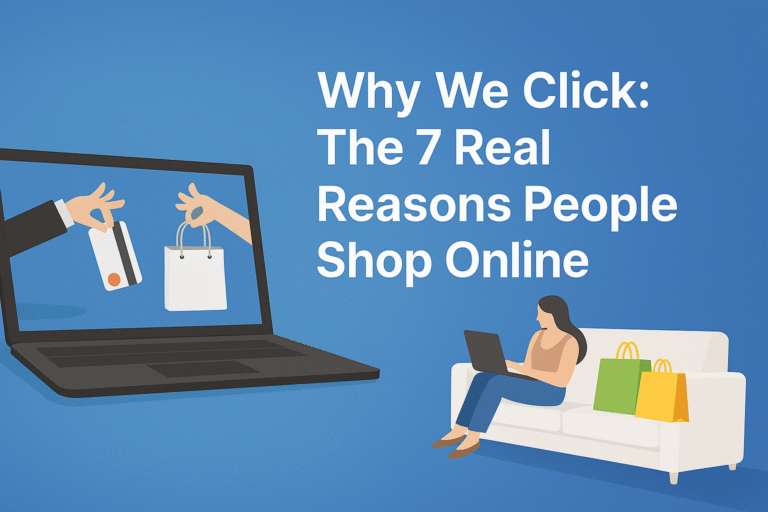Introduction: Beyond the Cart
In an age where a single tap can summon groceries, gadgets, or an entire wardrobe to your doorstep, it’s worth asking:
Why do people shop online?
The answers are deeper than just “it’s easy.”
They involve psychology, technology, time-efficiency, trust, and, most importantly for merchants, search functionality.
Let’s break down the most compelling drivers of online shopping behavior, and how mastering eCommerce search can turn browsers into loyal buyers.

1. Convenience is King
Top reason? Accessibility.
Online shopping allows people to:
- Buy anytime, anywhere—no closing hours.
- Avoid crowds, queues, or driving.
- Multi-task during work, travel, or leisure.
💡 eCommerce search engines must support this convenience with fast, relevant, and intuitive results. If search lags or misfires, convenience is instantly lost.
2. Search Personalization = Instant Gratification
People expect instant answers and tailored results. When they type “blue yoga mat,” they don’t want red dumbbells. They want precision.
Search plays a massive role here:
- Autocomplete reduces effort.
- Synonym matching understands varied phrasing.
- Search facets help filter instantly.
Example:
A shopper types “hoodie with zipper.” A smart engine also shows “zip-up sweatshirts”—that’s intelligent relevance.
3. More Choice, Less Pressure
Online stores offer a seemingly endless aisle of options. Shoppers can:
- Compare brands and prices
- Browse styles without salesperson pressure
- Read reviews before deciding
But that choice can be overwhelming—unless your search experience guides discovery.
With smart filters, related search suggestions, and visual cues, you help users navigate the digital shelf confidently.
4. Better Deals & Dynamic Pricing
Many shop online because it’s easier to find deals and compare prices. Plus, online-exclusive discounts, promo codes, and bundles sweeten the experience.
Your eCommerce site should support:
- Searchable price filters
- Promotional tagging in results
- Dynamic search results tied to current offers
A poor search engine? It buries your best deals.
5. Search-Led Discovery Is Addictive
Users often start with one product in mind—and end up discovering much more. That’s not accidental. That’s search behavior design.
Examples of discovery-enhancing features:
- “Related searches”
- “People also viewed”
- “Trending products”
- “Search as you type”
A powerful search engine for eCommerce doesn’t just find—it guides, recommends, and inspires.
6. Mobile & Voice Shopping Trends
People shop on smartphones while commuting or multitasking. Voice assistants like Siri, Alexa, and Google now drive hands-free product discovery.
Your eCommerce search must:
- Be mobile-optimized
- Support voice-to-text queries
- Deliver results with speed and context
Voice shoppers don’t say “Add to cart.” They say, “Buy noise-canceling headphones under $100”—your search needs to decode that intent.
7. Trust, Privacy & Return Policies
Online shopping now feels secure for most consumers thanks to:
- Encrypted payments
- Easy returns
- Clear privacy policies
But what builds trust fastest? Finding exactly what you want without confusion.
That’s where your search UX comes in again. Precision = trust.
Expertrec: The Search Engine Behind Better eCommerce Experiences
If you want to capture shoppers the moment they arrive, Expertrec equips your site with a world-class search experience.
What Expertrec Delivers:
- Lightning-fast, AI-powered search
- Automatic synonym handling
- Personalized suggestions
- Real-time intent recognition
- Seamless integration with your platform
Whether they come for speed, deals, or discovery, Expertrec turns their reason for shopping into a reason to stay.
Conclusion: Know Why They Shop, Then Help Them Do It Better
Understanding why people shop online is step one. Optimizing your search engine to meet those needs is step two.
With Expertrec, you give shoppers not just a store, but a frictionless journey from curiosity to checkout.
And that’s how modern eCommerce wins.
FAQs
1. Why do people prefer shopping online over in-store?
For convenience, variety, pricing, and comfort. It saves time and effort.
2. How does eCommerce search influence shopper behavior?
It determines how easily users find products, get inspired, and make confident purchases.
3. What role does personalization play in online shopping?
Huge. Personalized search results increase relevance, reduce friction, and boost sales.
4. What is the biggest frustration for online shoppers?
Not finding what they’re looking for. That’s why smart search tools are crucial.
5. How does Expertrec help reduce bounce rates?
By delivering instant, accurate, and engaging search results that match user intent.




